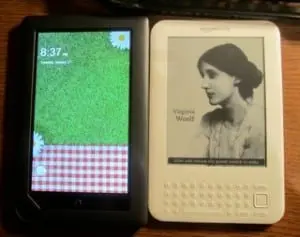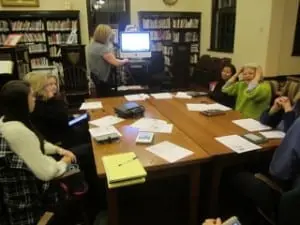
Butterfield and Desmond-Fish embrace technology and educate patrons through workshops
By Alison Rooney
It’s not your grandmother’s library anymore. Or maybe it is if your granny is like many of the seniors in Philipstown who are availing themselves of multitude of digital services now available at both Desmond-Fish and Butterfield libraries. Seniors are one end of the age spectrum; Desmond-Fish cybrarian (and yes, that’s a real occupation and not just a gimmicky name) Pam McCluskey says people using the library’s computers and many other digital services range in age from around 5 to 90. The digital services are similar at both libraries, and include not only access to the library’s online multi-branch collection database, but to over 2,000 eBooks and audio books which can be downloaded to a home reading device; language programs to practice with from home; genealogical software; practice Civil service exams; resume-building tools and more, all of which are now accessible from home. At Desmond-Fish there is even a complete archive of the Kingston Daily Freeman newspaper, dating back to the 19th century. New York Times archives dating to 1980 can also be accessed from home. Both library websites have many instructional videos easily accessible on how to use the various equipment and programs available.
Gillian Thorpe, Butterfield’s director, sees all this as the future, “In the middle of the night you have access from your home and you can download a book. More and more, that’s where I see libraries going.” For Thorpe, many aspects of this are liberating, “In so many ways, in this budget-conscious era it is crucial. Shelf space is no longer an issue. Now I actually need more people space; more people are here — it’s packed, and we need more tables. I can actually envision going out and helping people in their homes.”
At Desmond-Fish, McCluskey feels their number one service is in-person computer help. She offers special computer training sessions each Friday and Saturday from 2 to 3 p.m., and is often available at other times for all sorts of consultations, as are the rest of the well-trained staff. “If you can bring it in, we’ll help,” she says, “bring in anything — laptops, printers, anything but a toaster. Even the toaster — I’ll find a good book on it for you.” There are no silly questions, she insists, whether it’s e-mail navigation, eliminating a virus or answering pre-purchase questions on how much of this gigabyte or that RAM is best to load your computer up with, she can help. “Computers were designed by geeks, so let me show you the way a geek thinks,” say McCluskey. The only stipulation, she says, is that “If you bring something in, you cannot drop it off; we are not a Best Buy. It’s a learning experience: I’ll explain to them how they can fix it. It can be anything — I’ve shown people how to do mailing labels for Christmas cards; how to use social networks; how to extract just the minimum from a complicated software program to do what you need it to do; how to make websites; do photo editing, anything.” She can do the same for virtually any device, Smart Phones, iPads, all e-Readers.

Thorpe sees it similarly, “Our role as a library is to test drive technology. Before you spend money, borrow something from us … The statistics are phenomenal as to how fast this has caught on, compared to other technology.” Both libraries have eReaders for loan; several varieties, including Nooks, Kindles and a Kobo, in fact. In a change, which took effect this past December, E-books are now available for the Kindle, opening up a whole avenue of library loans to the many owners of these devices. Both libraries will also happily accept donated eReaders and can clear all personal data and help people transfer all of their files to their new eReader. Aware that this vast new world of eBook and audio book downloads and loans is still very new and confusing to many, both libraries are also offering workshops to explain the mysteries.
Thorpe conducted the first of a planned series of workshops on e-Readers last week at Butterfield. Originally planned as a hands-on session where she would work with each person on his or her device, the session filled up rapidly, with a waitlist, and wishing to accommodate as many as possible, Thorpe changed the structure to a group presentation. Her talk took participants through the screens they would encounter using the eLibrary on the Butterfield website to e-borrow downloaded books. Thorpe explained how the consortium of 66 mid-Hudson libraries are purchasing these titles together. About 2,000 items, not including the many more classics downloadable through the Project Gutenberg public domain site, are now available, with more titles being added constantly. Users can search amongst categories, including New York Times bestsellers, just released and audiobooks. Thorpe’s talk de-mystified such novel concepts as loan times for downloaded books, whether a computer is needed as well as an eReader (it is), can books be accessed through multiple computers in the same household? (they can, through log-ins), how to donate ‘used’ eBooks — those one has finished reading — to the library? (Thorpe is researching that “great idea”.) She also addressed the issue of what type of book files can work with what type of device. Calling the technology very much a work in progress, and sure to change almost as quickly as instructions are learned, Thorpe also informed the attendees that the cost of e-books was rising rapidly. Titles which were originally coming out at $6 or $7 have now frequently risen to $16 or $17 as publishers are well aware of the popularity of this new format. Thorpe made all of the handouts distributed to the participants available as downloadable files — these may be found at the end of this article.
McCluskey will be offering a workshop at 2 p.m. on Sunday, Jan. 22 asking the question: “Did You Get a new Nook, iPad or Kindle? We’ll show you how you can get free eBooks with your library card. Also find out helpful tips and tricks. Explore your app store and features.” All of these workshops are free.
Desmond-Fish director Carol Donick thinks “the library’s role will continue; its purpose is to encourage learning and reading, lifelong and to make it available to everyone, regardless of economic status. That mission can only become more important in this age. Paper books are still part of the mix, but I’m using e-readers too — I love that I can carry one in my pocket or purse, and also I can read them without using my hands! We’re just providing more variety but as long as something is providing a worthwhile reading experience it will remain popular. It’s important for libraries to be around to level the playing field and also to experiment and try new things. Borrow some books and CDs you might not buy normally. This not only saves money but expands knowledge; broaden your horizons.” McCluskey concurs and feels that eReaders have caused children to dip into the classics more than they used to, “Since we have public domain books free for the keeping [no loan periods are involved] a lot of kids have jumped into reading classics that they never would have touched. They’re discovering authors that teachers used to have to force on them, on their own.”
There is still one very old-fashioned thing about the digital world available through the library: it requires a library card, albeit a plastic card now, with a PIN number. To obtain one, residents still need to visit the library. They must do the same for renewals, which need to be done every three years. But many people are visiting the libraries anyway, despite the at-home availability of many services. Often hubs during those stretches of power outages Philipstown has come to know all too well lately, they are filled with patrons using their Wi-Fi internet access and banks of computers at all times, for, as McCluskey notes, “Being able to get online is no longer just a fun thing. Business stops if you can’t; it’s becoming another important utility.” And then those are those situations no one can predict. McCluskey relates: “We had someone come in with an emergency. He had run over his phone with his car and all his pictures were on it and nowhere else. We did it — we got them back. He had to stick around, but we did it.”
For more information visit dfl.highlands.com or butterfieldlibrary.org. Both websites have tabs for eLibrary and eBranch at the top of the home page on their sites. Gillian Thorpe’s workshop handouts are linked below.
- Kindle How-To Guide
- eBook Reader How-to Guide
- Mobile Device How-to Guide for eBooks & audiobooks
- To see just the eBooks that are checked in now
- Library Compatible eBook Devices – for patrons who are looking to get an eBook reader
Photos by A.Rooney

